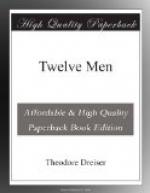“Mother,” he would say to his wife in that same oratorical manner previously noted, as he entered the house, “I’ve found such a poor family. They have moved into the old saloon below Solmson’s. You know how open that is.” This was delivered in the most dramatic style after he had indicated something important by throwing his overcoat on the bed and standing his cane in the corner. “There’s a man and several children there. The mother is dead. They were on their way to Kansas, but it got so cold they’ve had to stop here until the winter is broken. They’re without food; almost no clothing. Can’t we find something for them?”
“On these occasions,” said his daughter to me once, “he would, as he nearly always did, talk to himself on the way, as if he were discussing politics. But you could never tell what he was coming for.”
Then with his own labor he would help his wife seek out the odds and ends that could be spared, and so armed, would return, arguing by the way as if an errand of mercy were the last thing he contemplated. Nearly always the subject of these orations was some public wrong or error which should receive, although in all likelihood it did not, immediate attention.
Always of a reverent, although not exactly religious, turn of mind, he took considerable interest in religious ministration, though he steadily and persistently refused, in his later years, to go to church. He had St. James’s formula to quote in self-defense, which insists that “Pure religion and undefiled before our God and Father is this, To visit the fatherless and widows in their affliction, and to keep himself unspotted from the world.” Often, when pressed too close, he would deliver this with kindly violence. One of the most touching anecdotes representative of this was related to me by his daughter, who said:
“Mr. Kent, a poor man of our town, was sick for months previous to his death, and my father used to go often, sometimes daily, to visit him. He would spend perhaps a few minutes, perhaps an hour, with him, singing, praying, and ministering to his spiritual wants. The pastor of the church living so far away and coming only once a month, this duty devolved upon some one, and my father did his share, and always felt more than repaid for the time spent by the gratitude shown by the many poor people he aided in this way.
“Mr. Kent’s favorite song, for instance, was ’On Jordan’s Stormy Banks I Stand.’ This he would have my father sing, and his clear voice could often be heard in the latter’s small house, and seemed to impart strength to the sick man.
“Upon one occasion, I remember, Mr. Kent expressed a desire to hear a certain song. My father was not very familiar with it but, anxious to grant his request, came home and asked me if I would get a friend of mine and go and sing the song for him.
“We entered the sick-room, he leading us by the hand, for we were children at the time. Mr. Kent’s face at once brightened, and father said to him:




